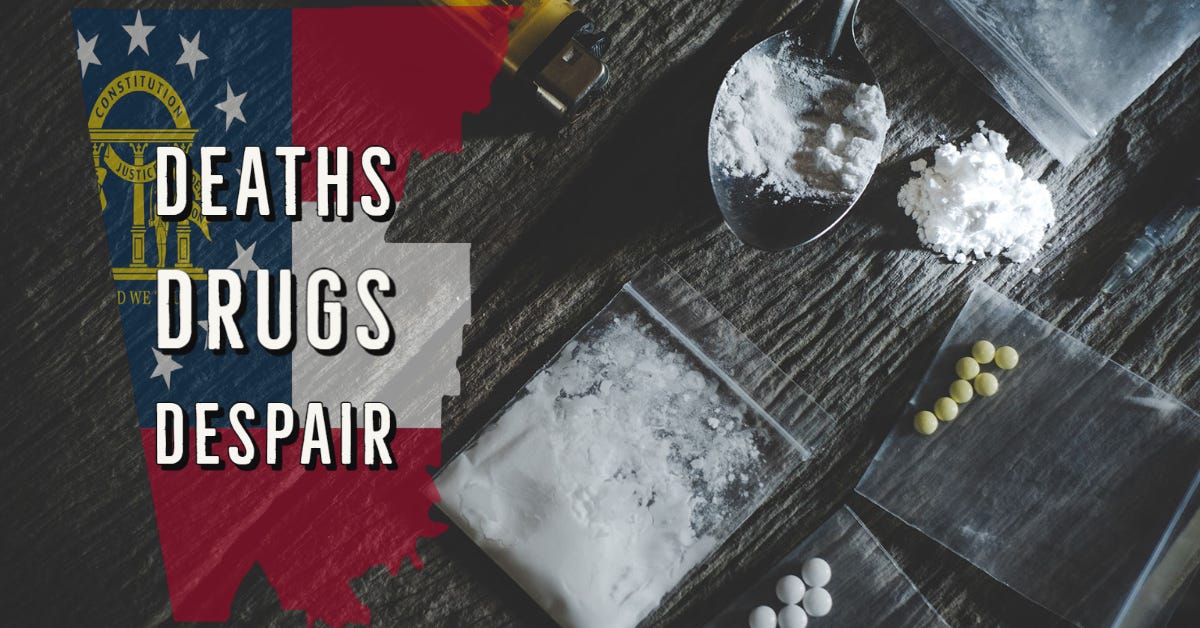“Nothing so needs reforming as other people's habits. Fanatics will never learn that, though it be written in letters of gold across the sky. It is the prohibition that makes anything precious” - Mark Twain
Last month, my mom passed away. Since we were estranged lately by my own—now indescribably regrettable—choice, I never had the opportunity to say goodbye or so much more. I was raised by my grandparents and was shielded but knew on some level as both my parents struggled with substance abuse, with dad dying when I was seven and my mom too often finding a system offering incarceration rather than treatment. I cannot help but dwell on the complex factors that contributed to their fates and reflect on one in particular: Drugs.
In just the first ten weeks of 2023, the Lookout Mountain Judicial Task Force investigated 15 fentanyl cases in Walker County. Compare this to the mere ten cases throughout all of 2022. The unincorporated regions of the county have witnessed medical calls skyrocket to nearly 40% of last year's total in just the first 10 weeks of 2023.
Indeed, the United States finds itself in the grip of a drug epidemic. In 2021, over 106,000 lives were lost nationally, with Georgia accounting for nearly 3,000 of those. And despite President Nixon declaring the national War on Drugs more than fifty years ago, taxpayers continue to foot the ever-growing bill.
Before we plunge headlong into yet another misguided "solution," let's take a step back and ask the fundamental question that's often overlooked: Why are these substances illegal, and is their prohibition justifiable?
It is a futile endeavor to find a justifiable reason for outlawing certain substances for individual consumption while permitting others. It's even more preposterous to argue that force should be employed to prevent a sane adult from consuming whatever they wish, let alone for the government to enforce such prohibitions.
If you disagree at all, READ THIS
"Nobody but a fool or an impostor pretends that he, as an individual, has a right to punish other men for their vices." - Lysander Spooner
Alcohol, tobacco, sugar, and caffeine—just like all of these illegal substances— possess the capacity to alter our consciousness and carry health risks. It's not the government's job or anyone else's to determine the moral value or merit of these habits. Instead, each person has the right to decide what brings joy and happiness to their life.
It’s worth noting what role personal choices play in personal health beyond the decision to consume or not consume illegal drugs, as the chart below illustrates. Is anyone up for a ban on sugar?
Do we have the right to wield the power of government to prevent an individual from consuming substances we arbitrarily decide are bad? I think not.
Lessons Not Learned
The prohibition of alcohol in the 1920s provides a cautionary tale, one that was sadly ignored in the ongoing War on Drugs. The disastrous experiment led to a surge in organized crime and started the growth of federal law enforcement agencies yet to find any check on expansion.
The enforcement of Prohibition began leniently, allowing black markets and bootlegging to thrive. However, as enforcement ramped up, consumption remained unaffected, and the potency of illegal alcohol increased.
Economists and social scientists studying the Prohibition era later introduced "The Iron Law of Prohibition," which posits that when drugs or alcohol are prohibited, black markets produce more potent and concentrated forms due to their efficiency in storage, transportation, and sales.
"But we can't legalize drugs!" cry the naysayers.
To them, I say yes, we can and we must. As a Republican, I find it disheartening that we champion a pro-life stance on abortion while promoting policies that criminalize personal habits and destroy lives. We can become a truly life-affirming party.
"We'll turbocharge addiction across the country!" some fear.
This is unlikely. In the 2012 GOP primary debate in South Carolina, Chris Wallace posed the question to Ron Paul. His response asking if anyone would go out and do heroin tomorrow if it was suddenly legal nailed it. No matter the number of users, individual users would be much better off if drugs were legal. Today, addicts face exorbitant prices, unknown and adulterated drug quality, and are driven to criminality and danger to support their habit.
The lessons from Prohibition reveal that we cannot eradicate the drug trade and certainly have no business coercing drug abstinence. As long as drugs remain illegal and mountains of money are involved, it is pointless to expect an end to drug traffic or even a significant reduction.
The Iron Law of Prohibition warns us of the consequences if we persist on this path, with even more potent opioids waiting in the wings to replace fentanyl. Instead, let's advocate for drug legalization, regulate them just like alcohol and other substances, eradicate the stigma individuals face, put an end to family destruction, deliver a crushing blow to drug cartels, save countless lives, and jumpstart economic growth and innovation.
In writing this article, it gnawed at me that all of this was known three decades ago when my parents first confronted their own battles with substance abuse, facing a public more inclined to stigmatize than comprehend and a system that worked against them and countless others. Would they still be alive today, and would their lives have taken a different path had the general public and leaders set aside their personal biases, acknowledged the facts, altered drug policies, and reaffirmed our commitment to limited government predicated on the consent of the governed? It's entirely possible.
Change on this issue will not originate from our party and elected leaders and officials; it is the public, the communities, the neighbors, and the individual citizen that must serve as the catalyst, driving our leaders to implement these transformative changes.









